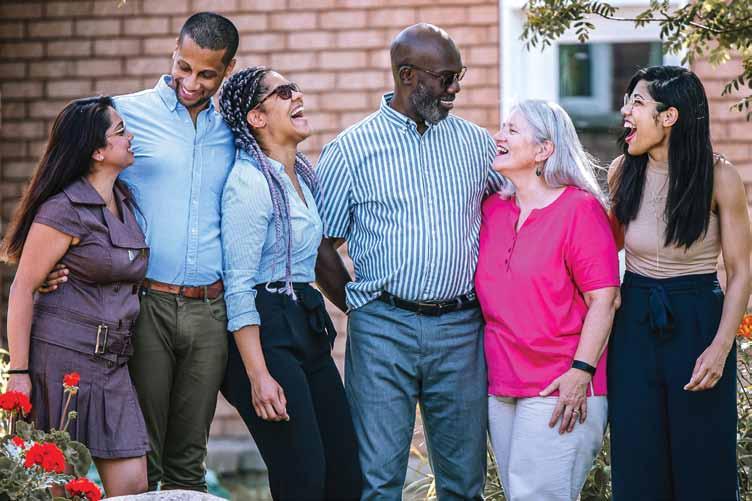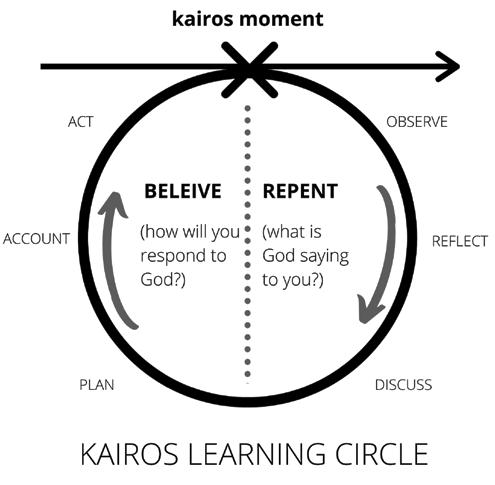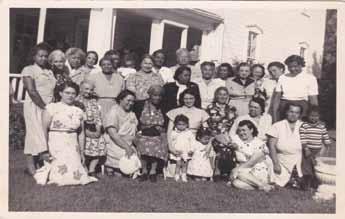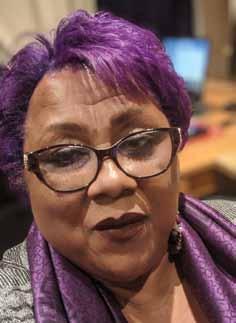
5 minute read
A Call to Fast for Racial Justice
CONNECT TO MISSION A CALL TO FAST FOR RACIAL JUSTICE For Such a Time as This
The stor y of Est her teaches us that prayer and fasting rightly precede advocacy. Our friends, family, colleagues and leaders who are Black, Indigenous or People of Colour depend on our sustained and intelligent engagement to end systemic reacism across all spheres.
Advertisement
The Plan
Pick five days in October. We suggest Monday, October 19 – Friday, October 22.
Gather a journal or paper, pen and your Bible.
On each of those days: • Fast. Ask God to show you how to fast on these days: giving up one meal; liquids only until supper; no television or web surfing. He will tell you. • Read through the day’s passage and Scripture prompt. • Write down what gets your attention from the passage and Scripture. As you write, you slow down and
God begins to have room to speak. • Pray the Scripture. The Holy Spirit may lead you to confess; to pray for someone; to give thanks; to ask for guidance using the words of Scripture. • End with an action. Read the action prompt. What is God asking you to do or be? Write that down. Keep it simple. Then commit.
Day 1 - Ethnicity
We don’t often hear sermons or do Bible studies focused on the topic of ethnicity and race. Perhaps we don’t think it’s relevant to our faith or we are afraid of offending people. We don’t want to seem “political.” More often than not we don’t know how to talk about race and ethnicity and so we withdraw from conversations around those topics.
However, the realm of ethnicity and race is not exempt from the influence of sin. Our world is in need of the gospel—a good news that is not afraid of addressing ethnic differences. And we need Christian voices to call for change and reform—with Jesus as the transforming centre of it all. Scripture prompt: Revelation 7:9-10 (NLT): After this I saw a vast crowd, too great to count, from every nation and tribe and people and language, standing in front of the throne and before the Lamb. They were clothed in white robes and held palm branches in their hands. And they were shouting with a great roar: “Salvation comes from our God who sits on the throne and from the Lamb!” Action: What can you do to see the beauty of other cultures?
All text was extracted from a 40-day prayer and reflection guide, published by Missio Portland, that was part of the church’s call to seek God’s heart for justice and racial reconciliation during August and September. The guide was retrieved from missioportland.org. This is an excellent resource for groups and churches and you’ll find a link to the full guide on our website at baptistwomen.com/ causes/racial-justice.
Day 2 - Prejudice
Anyone hurt by a member of a different ethnic or racial group is at risk for developing prejudice against all members of that group. Even slight offenses may powerfully reinforce old biases. The conflict between Israel and Edom shows this. (Genesis 27, Exodus 17, Numbers 10, Deuteronomy 25, Psalm 83, Amos 1, Obadiah 1).
Rather than furthering stereotypes, we can reach out and seek better understanding. Scripture prompt: 1 John 4:20 (NLT): If someone says, “I love God,” but hates a brother or sister, that person is a liar; for if we don’t love people we can see, how can we love God, whom we cannot see? Action: What can you do to guard against prejudice and keep it from compromising your integrity as a Christ follower?
Day 3 - Extremism
In Galatians, Paul recounts his dramatic meeting with Christ on the road to Damascus and his subsequent conversion. God did more than reverse Paul’s theology though. Imagine Paul’s reaction when Ananias informs him that God had chosen him (Paul) to take the message of Christ to the Gentiles —an unthinkable task for a man wholly committed to living by all the laws and traditions of Judaism.
Paul’s dramatic transformation challenges us to examine the prejudices that keep us from living out God’s love for the world. Scripture prompt: Galatians 3:28 (NLT): There is no longer Jew or Gentile, slave or free, male or female. For you are all one in Christ Jesus. Action: When you find racial and cultural biases where you live, work or worship, do you challenge that thinking? Can God use you to take His name to people whom you consider outsiders?
Day 4 - Restoration
Our Bible study in this issue looks at Jesus’ encounter with the Samaritan woman at the well (page 20). In choosing to speak with her, Jesus redeems ethnicity for His disciples and for the woman. Ethnicity no longer limits mission. In the Samaritan woman, ethnicity becomes the vehicle, the sacred vessel in which God’s story comes to light.
When we know our ethnic stories and the narratives of those around us, we begin to realize the complexity of values, scars, trigger points and words to avoid. Scripture prompt: John 3:16 (MSG): This is how much God loved the world: He gave his Son, his one and only Son. And this is why: so that no one need be destroyed; by believing in him, anyone can have a whole and lasting life. Action: What assumptions and idolatries can you lay down to allow Christ to bring healing to you?
Day 5 - Action
There is no clear and right definition of justice that excludes God. The Bible condemns injustice because God is just. As the ultimate lawgiver, He strongly opposes injustice.
Biblical justice is rooted in seeking the welfare of those unable to fend for themselves—those who frequently get abused and treated unjustly. These are the poor, widows, orphans, foreigners, and yes, those who face systematic oppression based on race. It is our duty to take action. We can’t just talk about justice. We must do justice.
Scripture prompt: Micah 6:8 (NiRV): The Lord has shown you what is good. He has told you what he requires of you. You must treat people fairly. You must love others faithfully. And you must be very careful to live the way your God wants you to. Action: What are some practical ways you can “do justice” in your life?







